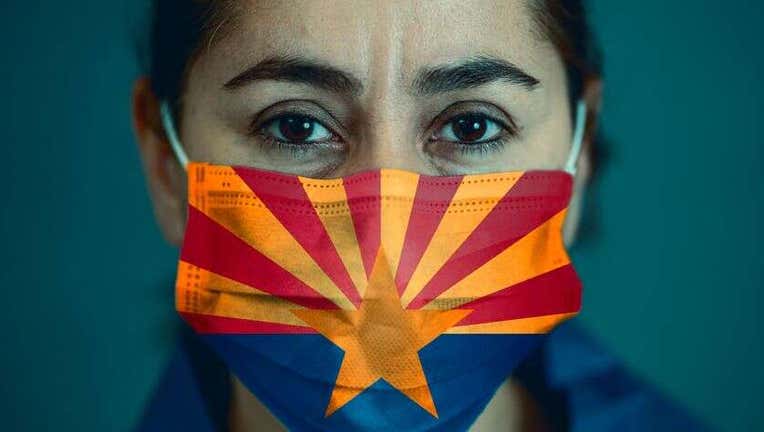Arizona sees over 1,000 new COVID-19 cases for a 3rd day

Face mask with Arizona flag (file)
PHOENIX - Arizona health officials are reporting over 1,000 new COVID-19 cases for a third day.
The state Department of Health Services released its latest daily virus numbers on July 16, finding 1,251 new virus cases and another 17 virus-related deaths.
This brings Arizona’s pandemic totals to 906,116 cases and 18,100 deaths.
The number of hospitalizations because of the virus have also been inching upward for the past week. As of Thursday, 719 people were hospitalized statewide. Of those, 185 were in ICUs.
The seven-day rolling average of daily new cases in Arizona has risen over the past two weeks from 528.3 on June 30 to 851 on Wednesday. The seven-day rolling average of daily deaths in Arizona has risen in that same time period from 10.8 to 11.4.
Officials have attributed the upward trend to July 4 gatherings and the spread of the delta variant.
Like other states, Arizona has seen a massive slow-down when it comes to vaccinations. More than 6.6 million doses have been administered to date. The percentage of the eligible population that has gotten vaccinated remains at just over 50%. According to the state dashboard, 3.6 million people have had at least one vaccine dose and 3.2 million are fully vaccinated.
Coronavirus in Arizona
- COVID daily case counts over 1,000 in Arizona as Delta Variant takes hold
- Gov. Doug Ducey, Arizona school districts at odds due to COVID-19 policies
- Arizona reports COVID-19 case bulge, cites ‘reporting issue’
- Maricopa County health experts expect the Delta Variant to increase in Arizona
RELATED:
MORE: Find COVID-19 vaccine locations in your area
MORE: Maricopa County COVID-19 vaccine status updates
MORE: Arizona Dept. of Health COVID-19 vaccine prioritization
In order to protect yourself from a possible infection, the CDC recommends:
- Avoid close contact with people who are sick.
- Avoid touching your eyes, nose, and mouth.
- Stay home when you are sick.
- Cover your cough or sneeze with a tissue, then throw the tissue in the trash.
- Clean and disinfect frequently touched objects and surfaces using a regular household cleaning spray or wipe.
- Cover your mouth and nose with a cloth face cover when around others
- Wash your hands often with soap and water for at least 20 seconds, especially after going to the bathroom; before eating; and after blowing your nose, coughing, or sneezing.
- Monitor your health daily
Symptoms for coronavirus COVID-19 include fever, coughing, and shortness of breath. These, of course, are similar to the common cold and flu.
Expect a common cold to start out with a sore or scratchy throat, cough, runny and/or stuffy nose. Flu symptoms are more intense and usually come on suddenly, and can include a high fever.
Symptoms of COVID-19 may appear more slowly. They usually include fever, a dry cough and noticeable shortness of breath, according to the World Health Organization. A minority of cases develop pneumonia, and the disease is especially worrisome for the elderly and those with other medical problems such as high blood pressure, obesity, diabetes or heart conditions.
RELATED: Is it the flu, a cold or COVID-19? Different viruses present similar symptoms
To protect yourself, wash your hands well and often, keep them away from your face, and avoid crowds and standing close to people.
And if you do find yourself showing any of these flu or coronavirus symptoms - don't go straight to your doctor's office. That just risks making more people sick, officials urge. Call ahead, and ask if you need to be seen and where.

